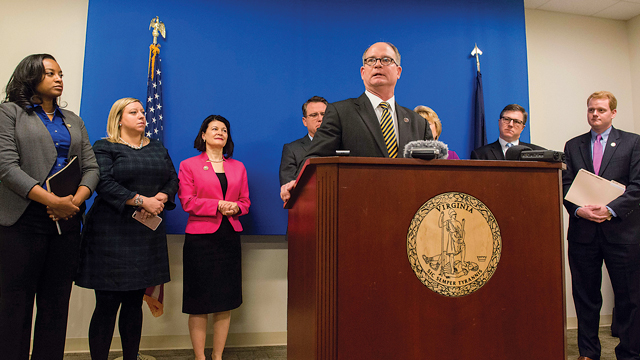Pictured: Caucus co-chair Sen. Monty Mason speaks during the Foster Care Caucus’s press conference on Jan. 15. He is backed by Del. Jennifer Carroll Foy, co-chair Del. Emily Brewer, Sen. Barbara Favola, Sen. Bryce Reeves, Sen. Janet Howell, Del. Chris Peace, and Del. Chris Hurst.
Virginia’s lawmakers are signaling that the needs of children and youth in foster care must be a priority. How exactly? A bipartisan group of state senators and delegates recently formed the first-ever Foster Care Caucus in the General Assembly.
What is a caucus?
When legislators identify a common interest area, they can form a group called a caucus to learn more about the issue and identify a common strategy for changing policy. Each political party has a standing caucus, and a quick scan of the legislative calendar shows meetings of the New American Caucus, the Sportsman’s Caucus, and the Legislative Black Caucus, among others.
The new Foster Care Caucus is led by Del. Emily Brewer (R-Suffolk) and Sen. Monty Mason (D-Williamsburg). They are joined by legislators in both chambers and of both parties, many of whom have personal or professional experience with Virginia’s foster care system. This experience makes them passionate about addressing the long-standing deficiencies in a system that has led to poor outcomes for many children.
Del. Chris Peace, a Republican who represents parts of Hanover, King William, and New Kent, is a caucus member because he is an attorney who serves as a guardian ad litem (GAL) in juvenile and domestic relations court. GALs are appointed by judges to represent children in cases of abuse and neglect, among other circumstances. Serving in this capacity has made Del. Peace acutely aware of the gaps in Virginia’s foster care system and ways in which children’s well-being can be compromised as a result. For many years, he has carried legislation to improve outcomes for youth in foster care and those who leave the system at eighteen without having permanent family connections.
Why are they forming the caucus now?
The legislators involved decided to shed more light on this issue now for two main reasons: A report issued last December described glaring problems in Virginia’s system, and new federal legislation provides an opportunity to make major improvements to the child welfare system for the first time in nearly forty years.
The General Assembly’s Joint Legislative Audit and Review Commission (JLARC) studied Virginia’s foster care system and issued a report at the end of last year that included these findings:
• Only six percent of children in foster care were placed with relatives, about one-fifth as many as the national average (32 percent). Research shows children do better in families (versus group homes or other congregate settings), especially when they can stay connected to their own families.
• Of children ages twelve and older who entered foster care in Virginia between 2012 and 2016, 54 percent aged out when they turned eighteen before finding a permanent home – approximately double the 50-state average (25 percent). Youth who age out of foster care are more likely to have trouble finding employment, are less likely to finish school, and are more likely to become homeless than their peers.
• Fifteen percent of foster care caseworkers in Virginia carry caseloads of more than fifteen children at a time – higher than the widely accepted caseload standard of twelve to fifteen children per caseworker. Though a small number, the impact is large. These caseworkers collectively manage a third of all foster care cases.
Advocates and those involved in the system have known about these deficiencies for years. What has been lacking is the political will to change policies and provide funding so more children and youth are connected to permanent families – whether by reunifying safely with their own families, being taken in by relatives permanently, or being adopted.
The political will seems to be building, however, at a time when federal legislation is incentivizing Virginia to make changes. The Family First Prevention Services Act, passed by Congress in 2018, allows states to use federal funding to help children before they are removed from their homes for abuse or neglect, not just after removal has already occurred. To take advantage of this major policy shift, Virginia must make changes to allow at-risk children and families to receive effective and timely treatment for underlying causes of family instability, such as mental illness and substance use.
Sen. Mason became passionate about the issue of foster care after being appointed, along with Del. Peace, to represent the legislature in a planning process to help the Commonwealth comply with the Family First legislation. “We need to take this moment and make it a priority,” he said at the press conference that announced the formation of the caucus on January 15.
What does the caucus hope to accomplish?
Members of the caucus have introduced a variety of bills this session to improve the lives of children and youth in foster care. Bills have been introduced to enable more teens in foster care to obtain their driver’s license, freeze credit for youth in foster care so they will not be taken advantage of financially while in the system, and improve accountability for local social services departments. Legislation to increase the use of kinship care – or placing children with relatives instead of in foster care – is also being discussed. Finally, lawmakers have proposed state funding that would allow local social services departments to begin addressing workforce shortages, thereby reducing caseloads and staff turnover.
Making Virginia’s foster care system a leader in the country will take sustained focus and difficult decisions. For the sake of the 5,000 children and youth in Virginia’s foster care system, let’s hope the Foster Care Caucus is successful.




